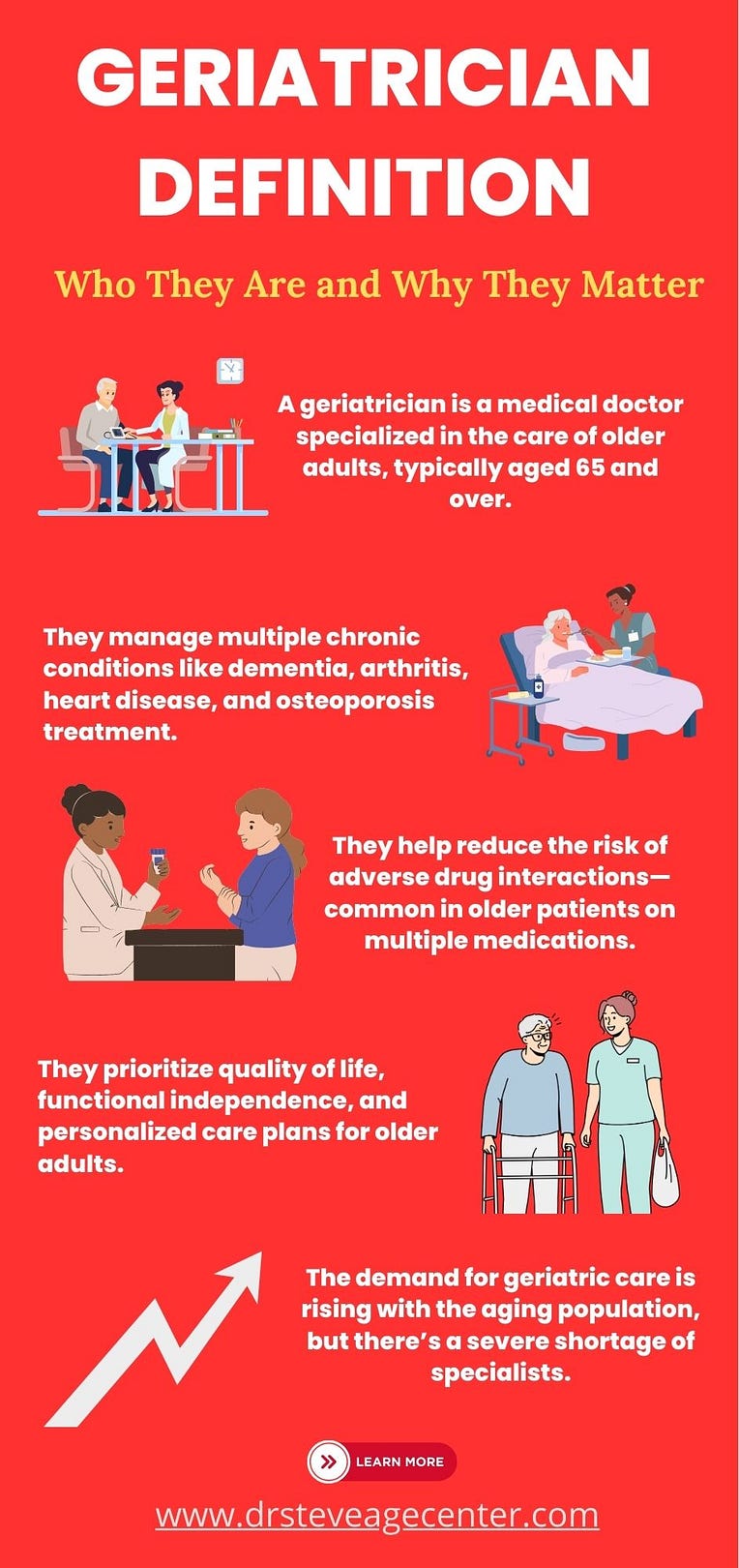Geriatrician Definition Explained in Simple Terms
When your children were little, you likely sought out a pediatrician because their needs differed from those of adults.
As we age, our health also changes — but surprisingly few people consider seeking specialized care from a geriatrician.
If you’ve ever Googled “geriatrician near me”, you’re already on the right path to finding care tailored to the needs of older adults.
What Is a Geriatrician?
A geriatrician is a medical doctor who specializes in the healthcare of older adults, typically those aged 65 and over. These physicians undergo additional training beyond general internal medicine or family practice to understand the unique physical, mental, and social challenges of aging.

According to Dr Steve Paul Manjaly, “As we get older, our bodies change. The kinds of conditions we have and how those conditions interact with each other differs from what adults under the age of 60 typically experience.”
Why Geriatricians Matter More Than Ever
Today’s older adults face complex health challenges. A geriatrician can help manage conditions such as:
- Dementia and memory loss
- Osteoporosis and arthritis
- Incontinence
- Multiple chronic illnesses
- Medication side effects and interactions
Geriatricians focus on improving quality of life, not just treating symptoms. Their goal is to preserve independence, mobility, and mental well-being.
When Should You See a Geriatrician?
There’s no set age to begin seeing a geriatrician, but there are clear signs it may be time:
- You have multiple ongoing health conditions
- One treatment is interfering with another condition
- You’re experiencing physical frailty or declining function
- You’re managing several medications
- You or a loved one has been diagnosed with a condition like Alzheimer’s
If any of these apply to you or a family member, it’s worth searching for a geriatrician near me to explore your options.
What Makes Geriatricians Different?
Medication Management
Older adults often take several medications daily. Geriatricians are skilled at minimizing drug interactions and eliminating unnecessary prescriptions.
Longer Appointments
Unlike many primary care doctors, geriatricians typically schedule longer visits, giving you time to ask questions and express concerns.
Whole-Person Approach
They consider not just your medical history, but also cognitive function, emotional health, mobility, and home life.
The Hospital Advantage: Geriatricians Improve Outcomes
If you’ve recently been hospitalized, a geriatrician can help guide recovery. Research shows that older adults receiving in-hospital care from geriatricians experience:
- Improved physical function at discharge
- Lower rates of readmission
- Higher chances of returning home instead of entering long-term care facilities
How to Choose the Right Geriatrician
If you’re choosing geriatrician for your elderly ones, consider the following factors:
- Training & Credentials: Is the doctor board-certified in geriatrics?
- Accessibility: Does the office accept your insurance? Are they open at convenient hours?
- Communication Style: Can they coordinate with specialists? Do they offer telehealth or electronic communication?
- Care Philosophy: Do they align with your goals for aging well? Ask about wellness programs, home visit doctor options or fall prevention classes.
Final Note: Aging Well with the Right Support
Aging brings changes, but with the right care, it doesn’t have to mean a loss of independence or vitality. A geriatrician provides compassionate, knowledgeable care tailored to the unique needs of seniors. Whether you’re navigating complex conditions or looking to maintain your health as you age, searching for a elderly care services in Bangalore could be the most empowering health decision you make.

Comments
Post a Comment